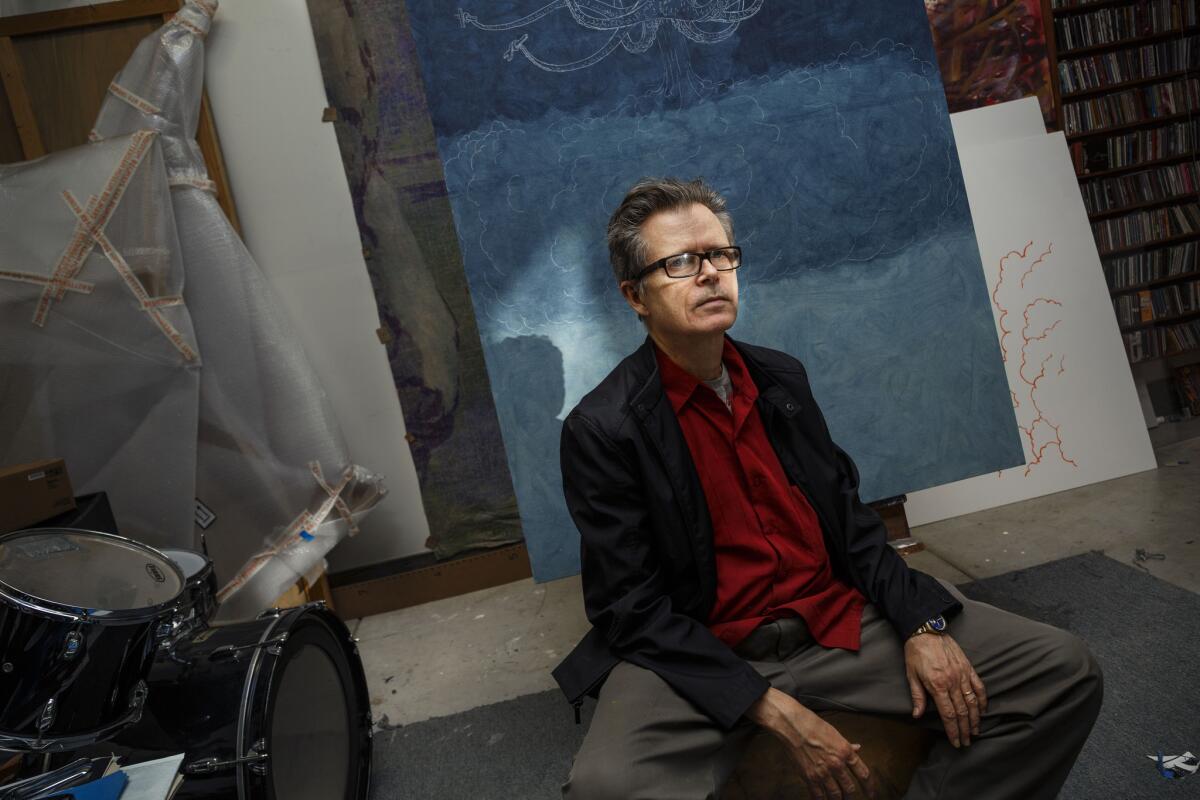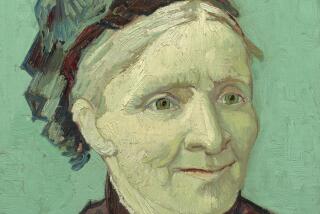Jim Shaw celebrates the fabric and weirdness of America at New Museum

Los Angeles painter Jim Shaw in his studio on Nov. 09, 2015.
Jim Shaw is the kind of artist who likes to collect. He started as a kid, with comic books and a library of Monsters magazine. As a teen, he progressed to records, where he refined his taste for the bizarre. One early score was “You’re My Girl,” a compilation of mood music and poetry delivered morosely by “Dragnet” star Jack Webb: “You’re my girl, the boys all know / You’re my girl, I’ve told them so.”
From there, Shaw moved on to other curious bits of cultural ephemera: garage sale ceramics, Christian tracts, medical illustrations, anti-Masonic literature and literature that he describes as “right-wing crackpot stuff.”
See the most-read stories in Entertainment this hour >>
But Shaw is best known for his vast collection of thrift-store paintings, which he has assiduously acquired in second-hand shops during various cross-country trips as well as in regular sojourns around the Los Angeles area. His one rule: The paintings must be $25 or less — “unless,” he says, “it is really amazing.”
Shaw’s immense catalog includes crude portraits of first ladies in porn poses, a touching lavender still life of toilet paper and an image of a turtle admiring a placid seascape while smoking a cigarette. Or is that a joint?
Over the last 25 years, Shaw has shown many of these works alongside his own paintings in dense salon-style installations that maximize their strangeness, juxtaposing contorted portraits of wild felines, for example, with an inexplicable image of a robot unleashing havoc on a woman in a white nightgown. Many of the thrift-store paintings are part of the critically acclaimed survey, “Jim Shaw: The End Is Here,” devoted to the L.A. artist at the New Museum of Contemporary Art in New York City through Jan. 10. — which also features the artist’s collections of science illustrations, religious posters and Masonic statuary.
These accumulated bits of cultural detritus are at the heart of the artist’s singular body of work: paintings, installation and video that plumb the uncanny underbelly of middlebrow life in America.
“It is,” says New Museum curator Massimiliano Gioni, “a celebration of America in all of its weirdness and obscurity.”
Shaw says that he doesn’t “officially” collect thrift-store paintings anymore. He sold the original set of roughly 400 paintings to an early collector. But a visit to his cluttered studio in Altadena — a one-story house that’s been repurposed into an art production center — reveals that old habits die hard.
Amid bins stuffed full of magazine illustrations and a collection of old wigs (“people are pretty grossed out by them”), he produces a pile of recently acquired amateur works, one of which was a gift from a friend. There is a woman with a green face and red eyes, an Indian goddess surrounded by a halo of arms, and a bucolic scene of a child unwrapping a gift next to a Christmas tree.
The latter, like a lot of pieces acquired by Shaw, has something slightly off about it. The light in the painting comes across as murky rather than soft. And the artist couldn’t quite figure out how to render the child’s hands, so his appendages look stiff and stumpy.
“It’s in the traditional mold,” deadpans Shaw. “Sad and depressing.”
Shaw is part of a generation of ‘80s and ‘90s L.A. artists who have explored these high-and-low themes in their work — among them, Paul McCarthy and Mike Kelley (a good friend of Shaw’s, who died in 2012).
Shaw first achieved renown in the late 1980s with a series titled “My Mirage,” which, through a series of 170 works, explored the adventures of Billy, a baby boomer-ish suburban boy who grows up to experiment with drugs, follows a woman he loves into a pagan cult and eventually is reborn as a fundamentalist Christian. The piece took the form of sculpture, assemblage, video and painstakingly detailed drawings and paintings that pay visual homage to the elements of culture that Shaw is so intrigued by.
A rendering of a Goldenbook children’s book shows Pinocchio clutching a knife before a sizable tarantula. A blotchy piece of notepad paper mimics the mischievous doodles of a demented schoolboy. And a black-and-white text piece pays homage to the cut-up writings of druggy postmodernist William Burroughs. All of it evidence of an American dream gone seriously wrong.
Since that series, Shaw has tackled the imagery that floats about in his subconscious in his Dream Drawings (storyboard-style illustrations of his dreams) and Dream Objects (re-creations of objects in his dreams) — the latter of which includes a painting of aliens copulating next to a painting of Windex. He has also created wild, immersive installations that employ theater backdrops and set pieces in ways that suck the viewer into a vast array of images that question issues of extreme religiosity, desire and consumerism.
Ever since World War II, our existence has shifted from the creation of necessities to creating things that aren’t necessities.
— Jim Shaw, artist
“Ever since World War II, our existence has shifted from the creation of necessities to creating things that aren’t necessities,” he says. “We are a society that has become about feeding those desires for consumption.”
The entire fourth floor at the New Museum is overtaken by one of these environments: an enthralling labyrinth of paintings and collages that employs a mind-boggling array of imagery, from Picasso to Plastic Man to peculiar religious tracts, to comment on the toxic effects of the military-industrial complex. (Dick Cheney and Richard Nixon figure prominently.)
“There is this cinematic intelligence to his work, in his portraits and in his dream drawings,” says Gioni. “And it’s this certain reflection of America, that our unconscious has been colonized by mass culture. If you look at Jim and Mike Kelley and Paul McCarthy, they all share this idea that the deeper you look inside yourself, the more you’re not going to find some literary, profound truths, you’re going to find comic book heroes and popular culture ... like looking inward to discover your true self, only to discover that your true self is just like everyone else.”
But did the artist really have a dream about aliens doing it?
“I dreamt of a painting of aliens having sex,” Shaw clarifies, “next to a bottle of Windex.”
At 63, Shaw retains an air of dapper mad scientist — with a full, buoyant head of graying hair and piercing blue eyes that he opens wide whenever narrating something particularly grotesque. When he works, he often wears two pairs of glasses to serve as makeshift bifocals, giving his sharp features an air of the unreal.
In the art world, Shaw is often identified with Los Angeles, but he is from Michigan: born and raised in Midland, where his father was a package designer for Dow Chemical.
“I had three sisters, and I was the youngest,” he says. “A prince and an outcast.”
After high school, he attended a junior college before enrolling at the University of Michigan in Ann Arbor, where he became friends with Kelley — and where they, along with several other students, founded the seminal noise band Destroy All Monsters. In 1976, they both moved to Southern California to attend the California Institute of the Arts, living in an old farmhouse on the outskirts of Sylmar.
“I was attracted to the movies,” says Shaw of choosing to study in California over New York. “There was all the experimental animation: Pat O’Neill, Kathy Rose, others. Plus, I’d be going to an art school that had a swimming pool.”
His studies, he says, were motivated less by the pursuit of advanced education than the avoidance of an actual job.
“I’m a late bloomer,” he explains. “The longer I put off entering real life the better. I didn’t really become an adult until I had a kid at 47.”
Soon after receiving his MFA, Shaw landed work doing special effects for the movies, where he was charged with tasks such as generating prehistoric animals and imagining the dream sequence of a god. In his time in the business, he worked on “Tron,” “The Abyss” and “A Nightmare on Elm Street 4: The Dream Master.” He also did the title sequence on the 1989 Geena Davis-Jeff Goldblum sci-fi rom-com “Earth Girls Are Easy.”
Watch the campy, cartoonish opener to “Earth Girls” and it’s not difficult to see how this work may have fed his art and vice versa. “It taught me to think things out before it goes on canvas,” Shaw says. “And I’ve used some of it in videos I did in the ‘My Mirage’ series.” But the best part of the job was that it allowed him enough time to make art, since he would work on a movie for three months and make enough money to take the next three months off.
In the mid-1980s his work and that of his peers began to get attention. In 1987, he was included in “CalArts: Skeptical Belief(s),” an exhibition of work by CalArts graduates that was shown at the Renaissance Society in Chicago and the Newport Harbor Art Museum (now the Orange County Museum of Art) in Newport Beach. Other exhibitions at galleries and museums quickly followed.
In 1990, he showed an installation of his thrift-store paintings at Glendale’s Brand Library, which drew the notice of Times critic Christopher Knight. “The assembly effortlessly jams the circuits of common expectation, creating a cognitive dissonance that turns out to be refreshingly insightful,” he wrote of the exhibition. “This decidedly outlandish show is among the best of the season to date.” The show traveled to Santa Barbara then New York.
Shaw was now able to set aside special-effects work to focus almost exclusively on his art. It was also around that time that he met his wife, artist Marnie Weber, with whom he has a 16-year-old daughter.
The intervening years have brought a good deal of success. Shaw is represented by a trifecta of prestigious commercial galleries, including Metro Pictures in New York, Blum & Poe in Culver City and Simon Lee in London. This year, in addition to his New Museum one-man show -- occupying three stories of gallery space -- he has another solo show at MASS MoCA, the contemporary arts center in Williams, Mass.
------------
FOR THE RECORD
Dec. 5, 4:01 p.m.: This article states that MASS MoCA is located in Williams, Mass. It is located in North Adams.
------------
Gioni says that Shaw’s work resonates because it reveals certain truths about American culture but also an innate curiosity on behalf of the artist.
“It’s a very generous embrace of America in all of its diversity and difference — with plenty of criticisms,” he says. “But also there’s compassion. And that’s what’s important about things like the thrift-store paintings and the other pedagogical collections. You see an engagement with forms of expression that would be left out of traditional definitions of art and of museums if it weren’t for him.”
Shaw remains deeply intrigued by outmoded artifacts and strange ideas, by the publications of marginal religious movements and zany conspiracy theorists.
“I spent a year reading the dictionary just to look for interesting words,” he says. “Like ‘phlogiston,’ the idea of fire or combustion as an element. There’s also a word for finding meaning in meaningless things.”
He pauses and admires the jammed shelves of his studio, stuffed with comic books, old illustration manuals and compilations of obscure photography.
“That’s what artists do,” he says, “through magical thinking, find meaning in meaningless things.”
Twitter: @cmonstah
More to Read
The biggest entertainment stories
Get our big stories about Hollywood, film, television, music, arts, culture and more right in your inbox as soon as they publish.
You may occasionally receive promotional content from the Los Angeles Times.











